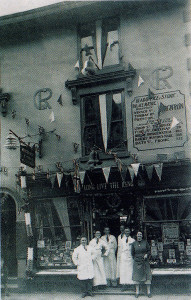
I was born in a flat above a multiple grocers’ known as Chard Bros, in the main street of Brixham, South Devon. My father was the manager.
In 1938 my family moved to premises further along the street where my father set up a grocery business of his own, and it remained in the family until 1964.
I remember being taught as a boy how to bone and roll a side of bacon, skin and cut up into wedges huge round blocks of cheese, flat-pack butter and margarine, and dried fruit including dates, prunes and candied peel. We also produced our own home-cooked ham. We would cut the rear end (gammon) from the side of bacon, bone and roll it and cook three at a time in a large gas cooker, adding vinegar and dem-erara sugar for extra flavouring. The aromas were something else! The hams were then breadcrumbed ready for slicing in the cooked meat machine. We also had a large bacon machine which was used to slice up pound after pound of delicious Wiltshire and Somerset bacon, the thickness of the slices depending on customers’ requirements.
Customers would phone or bring their order lists to the shop, and the provisions would be delivered promptly by an errand boy with his carrier bike within a radius of three to four miles.
With the advent of war in 1939 rationing reared its ugly head, and on the old kitchen
table at the back of the shop the weekly counting and checking of coupons took place in preparation for them to be sent to the local Food Office.
Brixham had its share of bombing from the enemy in those days. Walking to school one morning, I saw two German fighter bombers fly in off the sea and through the coastal valley in which the town lies, and drop bombs on the gas works and town centre – one of many ‘hit-and-run’ raids which took place in the early 1940s.
After Dunkirk Brixham was besieged by an influx of refugees from near and far. There were evacuees from London and the South-East, many Belgians from Ostend, French from their north coastal areas and some Dutch citizens. Many arrived with just the belongings they could carry’ aboard an assortment of vessels – trawlers, pleasure boats, anything that could get them across the Channel and away from the German menace. All these people had to be absorbed into the English way of life, schools, jobs etc., especially at that difficult time when food was in short supply. I recall my parents having to resist many pressures from customers wanting them to break the rationing laws.
However, life went on, and as I grew up dad bought his first vehicle for business and pleasure use, a Morris Oxford Traveller estate. This proved a wonderful workhorse, and gave us many years of trouble-free motoring.
With the coming of the supermarket, and people’s changing attitudes and priorities, we eventually had to sell up the property and business, and I was fortunate to find a job elsewhere,
People I meet still recall the old shop and the politeness and courtesy of those early years – so different from the cursory grunt or “Cheers!” which one receives when dealing with shops nowadays.
I have lived in this lovely part of Britain for most of my life, and in retirement enjoy walking the cliff paths and tors of Dartmoor with my big black dog. I enjoy Best of British immensely, especially the items and photographs about the countryside. Please keep up the good work.
Howard C. Binhatn








